2015 BDO Technology Outlook
Tech CFOs Remain Upbeat About Industry’s Future
Last year, the technology industry experienced a robust deal environment and a high volume of investments flowing into companies.
According to the 2015 BDO Technology Outlook Survey of 100 chief financial officers at U.S. technology companies, this ongoing positive environment has caused CFOs to remain optimistic about the year ahead. While the outlook is robust, finance chiefs remain cognizant of the factors that could inhibit business growth for 2015, such as data security challenges, accounting changes and tax concerns.
Finance Chiefs Confident About Revenue Growth
On the heels of an exceptional year for the technology sector, a majority of CFOs (70 percent) anticipate increased sales revenue in 2015, up from 67 percent last year. Overall, finance chiefs project a revenue increase of more than 12 percent, following forecasts of an 11 percent increase in 2014 and an 8.7 percent increase in 2013, pointing to continued optimism in the industry.
Another Blockbuster Year for Tech IPOs
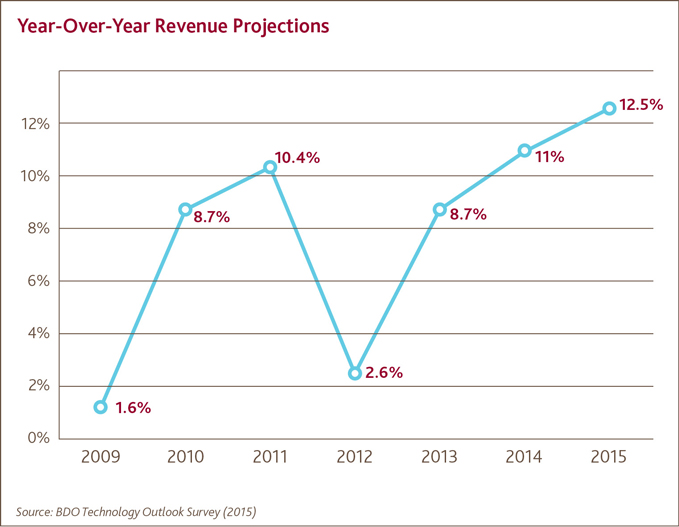 With Renaissance Capital reporting that tech IPO issuance rose 22 percent over last year to 55 deals—the highest level since 2007—CFOs are optimistic about IPO activity heading into 2015. A large majority of respondents (86 percent) say IPO activity will remain the same or increase in 2015. This sentiment is also reflected in the January 2015 BDO IPO Outlook Survey, with 73 percent of capital market executives at leading investment banks predicting an increase in technology offerings.
With Renaissance Capital reporting that tech IPO issuance rose 22 percent over last year to 55 deals—the highest level since 2007—CFOs are optimistic about IPO activity heading into 2015. A large majority of respondents (86 percent) say IPO activity will remain the same or increase in 2015. This sentiment is also reflected in the January 2015 BDO IPO Outlook Survey, with 73 percent of capital market executives at leading investment banks predicting an increase in technology offerings.
What’s more, venture capital-backed investments soared in 2014. According to Dow Jones VentureSource, investment returns from VC funds are on the rise as 105 VC-backed companies went public in 2014—the highest number since 2000. Thirty-nine percent of CFOs expect VC-backed companies will give rise to the most tech IPOs this year, followed by private equity (36 percent) and owner/manager or privately held businesses (25 percent; up from 18 percent in 2014).
Despite recent headlines around the uncertainty of another impending tech bubble, only five percent of CFOs believe the concerns about a tech bubble will have the greatest impact on the U.S. IPO market. Meanwhile, more than one-third believe the performance of recent tech IPOs will have the largest influence on the market, followed by U.S. market volatility (25 percent), global political and economic issues (23 percent) and appeal of IPOs in foreign markets (11 percent).
Recent Cyberattacks Fuel Data Security Fears
An annual report by the Ponemon Institute, which conducts independent research on privacy, data protection and information security policy, found that 43 percent of companies have experienced a data breach in the past year—up 10 percent from the year before. With the number of cyberattacks increasing, more tech executives are concerned about their own IT infrastructures and response plans. According to our survey, 67 percent have increased their spending on cybersecurity measures during the past year. Of those who have taken action, 90 percent implemented new software security tools, 72 percent created a formal response plan for security breaches, 48 percent turned to an external security consultant and 30 percent hired a chief security officer.
While many cyberattacks come from domestic and foreign entities, online security challenges could also stem from geopolitical issues. In fact, 14 percent of CFOs believe global political issues will be the leading barrier to industry growth in 2015. Recent threats have even captured the attention of the White House with President Obama proposing a budget that would increase cybersecurity spending to $14 billion.
Along the same lines, finance chiefs are also anxious about their intellectual property (IP) protection, with 47 percent saying foreign IP infringements has had the greatest impact on their IP security, followed by changes in patent law (24 percent) and patent trolls (20 percent).
Deal Pace Remains Strong, Software Leads M&A Activity
Last year saw a significant uptick in M&A transactions, and according to CB Insights, technology M&A deals and IPOs combined rose 58 percent in 2014. Following this momentum, nearly all CFOs (96 percent) believe M&A activity will increase or stay the same this year, on pace with last year’s forecast, and 66 percent expect that acquisitions will be primarily offensive. Close to two-thirds of CFOs (61 percent) believe the software sector, including cloud computing, will drive the most M&A activity in 2015, on trend with last year when 60 percent expressed a similar sentiment. In fact, International Data Group predicts that cloud computing initiatives will be the most important project for the majority of IT departments in 2015 and 42 percent of enterprises plan to increase their cloud computing spending this year. In addition, Forrester reports that Software-as-a-Service (SaaS) sales have been increasing at over 20 percent per year. As discussed in the Winter 2014 BDO TECH Software Newsletter, SaaS models are becoming more and more relevant as the business environment changes and the tech industry evolves. Traditionally, organizations purchased enterprise software, but on-premise solutions are becoming overpowered by SaaS, especially with the increasing use of mobile devices and related applications.
“The software industry is quickly shifting from the traditional licensing model to cloud-based offerings, such as Software-as-a-Service, to meet the overwhelming need for real-time responses and easy integration,” said Hank Galligan, leader of the Software Practice at BDO. “As the business environment evolves, companies are acknowledging the pressure to upgrade or introduce cloud computing services either through acquisitions or on their own.”
When looking at key drivers of acquisitions in today’s tech market, one-third of CFOs believe increased revenue and profitability will be the primary impetus for M&A activity in 2015, followed by improved market share (25 percent), gaining engineering and research capabilities (14 percent) and enhancing technology assets and intellectual property (13 percent), which dropped from 28 percent in 2014.
“Although the tech industry is cautious of overvaluation, finance chiefs are confident that deal activity will continue its momentum well into 2015. As consumers continue to demand innovative products and investments keep pouring into the sector, technology companies may be better positioned for business growth through strategic partnerships to expand their capabilities and offerings as well as to compete effectively and gain market share.” said Aftab Jamil, partner and leader of the Technology and Life Sciences Practice at BDO USA, LLP.
Surprisingly, CFOs are unfazed by overvaluation concerns in the industry, with 62 percent predicting that business valuations will increase this year, a 35 percent jump from 2014.
CFOs Unclear About New Revenue Recognition Standard
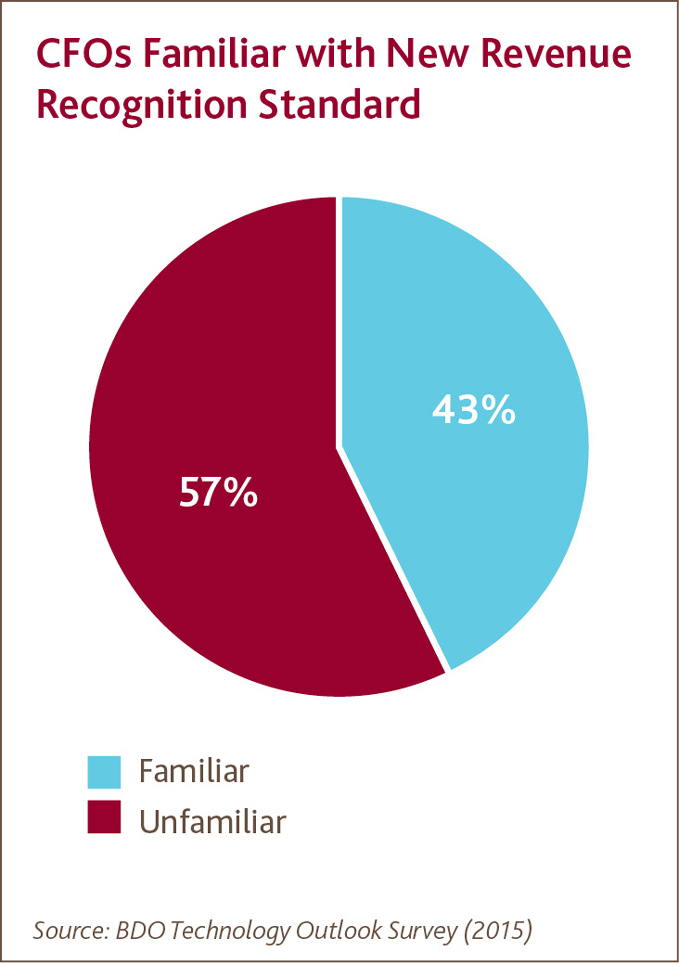 On May 28, 2014, the Financial Accounting Standards Board and the International Accounting Standards Board announced a new revenue recognition standard that is currently scheduled to take effect in 2017, replacing existing U.S. generally accepted accounting principles (GAAP). Although, the new standard may have significant impact on the way tech companies recognize revenue, our survey found that more than half of CFOs (57 percent) have not yet fully familiarized themselves with the changes. Of those who are familiar with the new rules, 52 percent are still analyzing the impact, 20 percent are ready to implement the new standard and 18 percent say they are looking for guidance on implementation. The majority (86 percent) are most likely to implement the new rules under the prospective approach and apply the new revenue standard to transactions initiated after the implementation date instead of restating their prior period’s financial results.
On May 28, 2014, the Financial Accounting Standards Board and the International Accounting Standards Board announced a new revenue recognition standard that is currently scheduled to take effect in 2017, replacing existing U.S. generally accepted accounting principles (GAAP). Although, the new standard may have significant impact on the way tech companies recognize revenue, our survey found that more than half of CFOs (57 percent) have not yet fully familiarized themselves with the changes. Of those who are familiar with the new rules, 52 percent are still analyzing the impact, 20 percent are ready to implement the new standard and 18 percent say they are looking for guidance on implementation. The majority (86 percent) are most likely to implement the new rules under the prospective approach and apply the new revenue standard to transactions initiated after the implementation date instead of restating their prior period’s financial results.
“Although the new revenue recognition standard’s effective date might be delayed, companies should be proactive about understanding the impact the new rules will have on their business. Companies can take specific steps now to prepare by analyzing current revenue streams and understanding where there are potential differences between current practice and the new standard,” said Ken Gee, assurance partner at BDO and member of AICPA’s Revenue Recognition Working Group.
Policy and Tax Concerns Persist
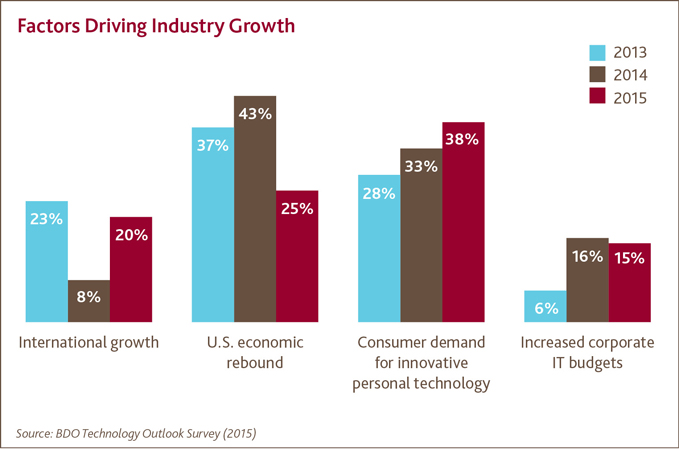 Pending tax proposals in Washington are leaving many finance chiefs uncertain about the future of their business growth. In fact, 24 percent of CFOs cite policy and tax changes as the top factor inhibiting overall business growth, on trend with 2014 (26 percent). Moreover, 50 percent cite U.S. corporate tax rates as the leading tax issue this year, a 35 percent increase from 2014.
Pending tax proposals in Washington are leaving many finance chiefs uncertain about the future of their business growth. In fact, 24 percent of CFOs cite policy and tax changes as the top factor inhibiting overall business growth, on trend with 2014 (26 percent). Moreover, 50 percent cite U.S. corporate tax rates as the leading tax issue this year, a 35 percent increase from 2014.
Even the debate around tax inversions, particularly for large corporations, is giving tech CFOs pause. Fourteen percent say they are most concerned about taxation of overseas activities, a significant increase from last year when only eight percent expressed similar sentiment. As companies look to expand their global footprint to remain competitive, 41 percent of CFOs believe the domestic tax system hampers their ability to effectively compete in the global marketplace.
“As the focus on U.S. taxation of overseas activities increases, multi-national organizations should carefully consider potential changes to U.S. tax policy when making global investment and operational decisions. Though many CFOs believe U.S. tax rates are too high relative to other countries, the concern hasn’t yet inspired Congress to make a move toward reform,” said Matthew K. Becker, Central Region Tax and National Tax Office Managing Partner at BDO.
International Expansion Drives Industry Growth
Although executives are concerned about global economic growth and international operations challenges, 20 percent of finance chiefs expect international expansion will be the key driver of industry growth in 2015, a significant increase from last year (eight percent). Meanwhile, 38 percent say consumer demand for innovative personal technology will be the leading factor to industry growth, followed by economic rebound in the U.S. (25 percent) and increased corporate IT budgets (15 percent).
Debt Markets Less Attractive to CFOs
As companies eye growth opportunities, more CFOs are seeking capital in 2015 (38 percent) compared to 2014 (34 percent). As a result, more finance chiefs cite that access to capital will be the greatest business challenge in 2015—16 percent vs. eight percent in 2014. Of those who are planning to raise capital, only eight percent say they will turn to the debt markets this year, which is a significant decrease from 2014 when 60 percent of CFOs said they would seek additional capital in public and private debt markets. Of the CFOs looking for funds, the majority (51 percent) say they will focus on forming strategic partnerships, followed by public equity (22 percent) and private sector equity (16 percent).
“Such investments can be non-dilutive to shareholders, because they are often tied to commercial products or services and collaboration agreements. Strategic partners typically have much better visibility into where a product line is going and are able to give a premium to a valuation,” said Aftab Jamil, partner and leader of BDO’s Technology and Life Sciences practice in an interview with The Wall Street Journal.
CFOs Boost Workforce, Access to Skilled Labor Remains Priority
As the industry continues to thrive and CFOs anticipate a surge in revenue, companies plan to expand their workforce for the fifth consecutive year. Ninety-six percent of finance chiefs expect the number of employees to increase or remain the same in 2015, consistent with last year’s finding of 91 percent. Moreover, as companies focus on business growth, executives are continuing to put an emphasis on sales and marketing efforts. As such, 49 percent of CFOs plan to increase their hiring the most in the sales and marketing department, followed by research and development (29 percent) and manufacturing (11 percent).
However, as companies strive to beat out their competitors by ensuring they have the brightest minds on staff, access to a skilled workforce remains a key challenge. Twenty-seven percent say the ability to attract and retain qualified labor as their greatest business challenge this year and 23 percent say a lack of skilled employees will be the biggest barrier to overall industry growth.
R&D Top of Mind Among Companies
Fierce competition will always be the impetus for innovation among tech companies, and this year, 41 percent of CFOs cite competition as the top business challenge. With competition top of mind, finance chiefs are proactively seeking to improve their service offerings by enhancing their product development efforts as well as R&D activities to stay ahead of the curve and launch new offerings. Among the CFOs who offshore or outsource services (20 percent), 74 percent are currently outsourcing or offshoring their R&D services, up from 54 percent last year. In addition to leveraging external resources, 29 percent of companies plan to invest the most in the R&D department with new hires, up from 21 percent in 2014.
Meanwhile, 70 percent of the same group of CFOs who outsource or offshore currently outsource or offshore their IT services and programming, a significant increase from 2014 (41 percent). In addition to R&D and IT services, 50 percent say they outsource manufacturing, 32 percent outsource distribution and 15 percent outsource call or help centers.
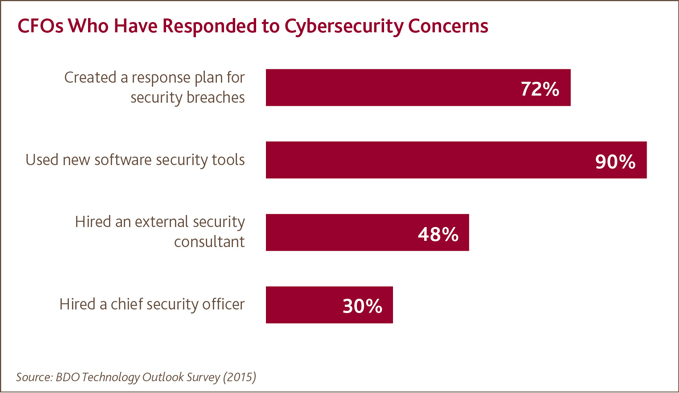
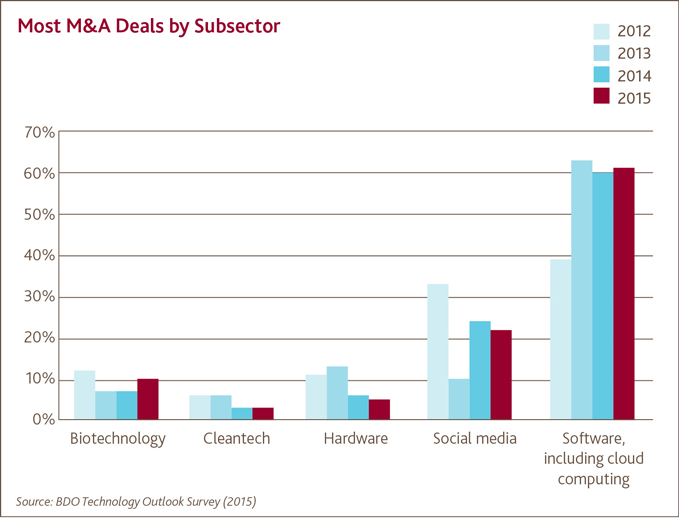
SHARE